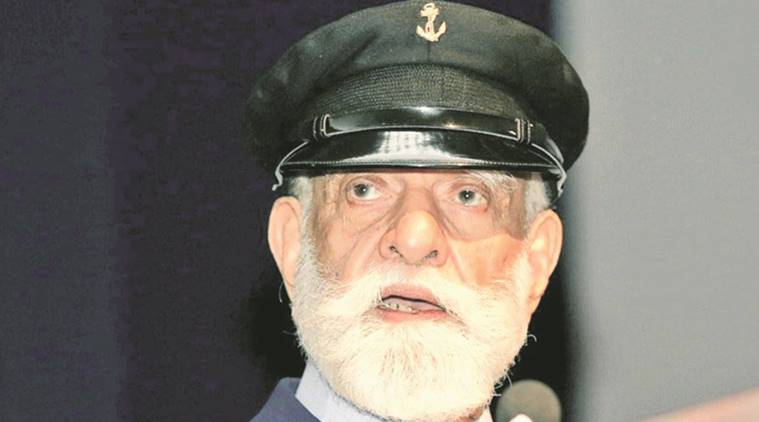Farewell Captain
Vice Admiral Manohar Prahlad Awati embodied the spirit of adventure and the tradition of sea-faring.

Vice Admiral Manohar Prahlad Awati
Vice Admiral Manohar Prahlad Awati (born September 1927) who passed away on November 4 in his farm-house in Satara district of Maharashtra will be long remembered with affection and admiration by the extended community of sea-farers in India and beyond for his sterling contribution to matters maritime and naval for almost seven decades. Commissioned in the Royal Indian Navy (RIN) in 1945, Manu (as he was referred to) was among the last of the pre-August 1947 generation of military officers who made the transition from “Royal” to “Indian” and helped shape the fledgling Indian armed forces.
In an image that is familiar in the Indian Navy, a young Manu Awati is seen receiving the Presidential colours from then President Rajendra Prasad. The onerous responsibility of nurturing the nationalist ethos in a normative manner was internalised by Awati.
Awati’s professional trajectory is distinguished. He was captain of IN ships Tir, Ranjit, Betwa, Kamorta and the cruiser Mysore before commanding the Western fleet. Former cadets recall the electrifying impact that a young Awati made on his wards in the Tir in the mid 1960s. The quintessential professional, the Awati rule-book was fair, firm and empathetic and brooked no lapse in personal integrity and officer-like conduct. Regal in bearing at six foot plus and a vintage sailor’s beard to boot, he was spartan in personal habit, and despite the image of the swash-buckling sailor — he was a teetotaller!
During the the 1971 war for Bangladesh, Commander Awati was captain of INS Kamorta and his operational conduct earned him a gallantry award. Subsequently, Awati proved to be the man of the hour. When the Indian Navy had a mini-mutiny on board the cruiser INS Mysore in 1973, a rare occurrence for a disciplined force, the navy appointed Captain Awati to restore the professional benchmarks. I was a young officer on the Mysore at the time and can recall the electrifying and empathetic presence of this strapping captain in his white shorts and blue stockings as he took effective charge of the sullen crew; the ship was soon back on even keel.
Training of the younger generation was a high priority for Awati and his tenure as the Commandant of the NDA, Khadakvasla allowed him to instil the values and qualities that he symbolised. Even today, there are many courses from the NDA who claim themselves as “Awati-trained” with pride.
Admiral Awati’s tenure as the fleet commander in then Bombay and later in Delhi as the chief of personnel enabled him to make his mark as a high-calibre military leader. He was a keen observer of some major punctuations in India’s complex civil-military relations — details that he shared with me in the last decade of his life — but with no malice whatsoever. His observations about the Emergency imposed by Prime Minister Indira Gandhi, the stance of the army top-brass at the time, the unctuousness that permeated the capital’s senior officials and the supersession of Lt General S K Sinha for the office of army chief et al were perceptive, objective and had many lessons for a younger generation of military personnel.
Completing his duty-watch in active service as the Flag-Officer-Commanding-in-Chief, Western Naval Command in 1983, Awati’s post-retirement contribution for 35 years had a national resonance. With little or no resources, he created the Maritime History Society in Mumbai and instilled an awareness about India’s rich maritime heritage in a tenaciously sea-blind society.
Ecologist, environmentalist (he often spoke proudly about the scrub jungle he had created in his home village, Vinchurni), author, raconteur par excellence — the most significant contribution that Awati made was to instil in India the spirit of adventure and the forgotten tradition of sea-faring. As he once recounted to me, “for 20 years post-retirement I knocked at various doors for support to embark upon an Indian circumnavigation sailing voyage and everyone thought I was nuts or drunk!”
Finally, then naval chief Admiral Arun Prakash (one of his cadets on Tir) recognised the merit in the project and India’s “sagar parikrama” became a reality that has allowed India to demonstrate the grit and perseverance of its young sailors — the recently feted all-women crew included. Credit for this and more must go to the unassuming but hugely determined and motivated Manu Awati who will be counted among India’s most illustrious national icons.
The writer is director, Society for Policy Studies, New Delhi.
For all the latest Opinion News, download Indian Express App
More From C. Uday Bhaskar
- The Podgy AdmiralAdmiral Nadkarni was an able, down-to-earth chief and a professional to the core..
- A Post-Fact ConflictHow truth has been obscured in the narratives on chemical weapons in Syria...
- On Such a Full SeaA judicious mix of essays that seek to contextualise India’s naval strategy against the backdrop of Asia’s regional security environment...








































No hay comentarios:
Publicar un comentario